
Food Policy: Lessons and Priorities for a Changing World
2025 Global Food Policy Report

Over the past 50 years, the world’s food systems have changed dramatically. Throughout, policy research has played a crucial role in providing evidence and analysis to inform decision-making that supports agricultural growth, better livelihoods, and improved food security and nutrition. The 2025 Global Food Policy Report examines the evolution and impact of food policy research and assesses how it can better equip policymakers to meet future challenges and opportunities.
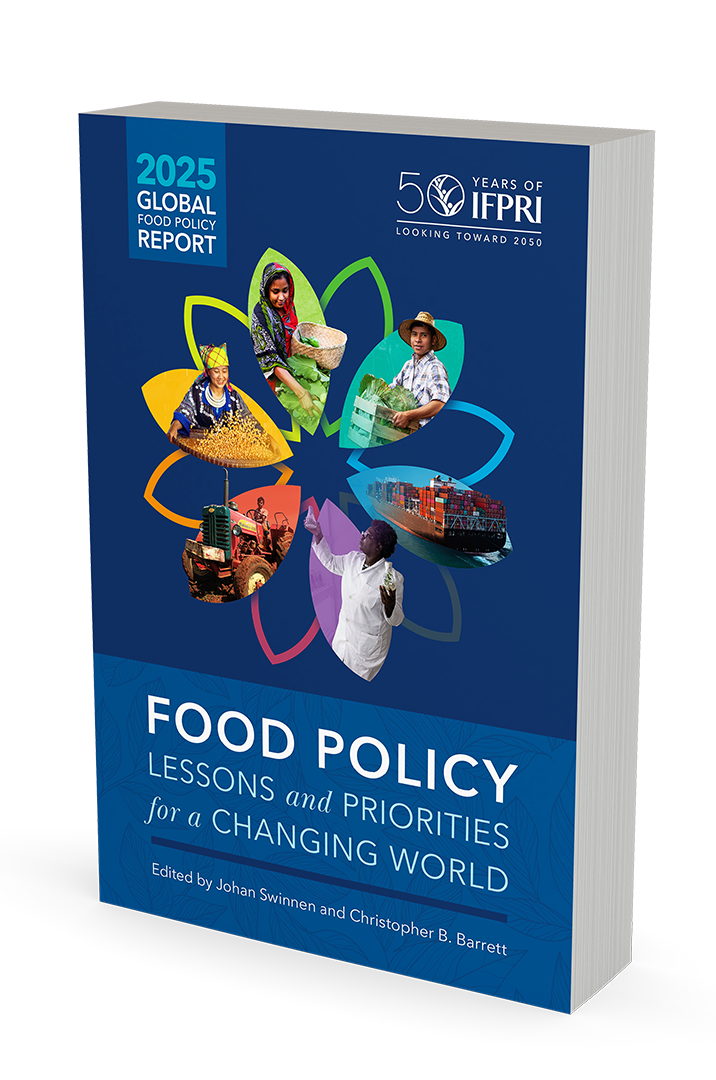
Foreword
Since IFPRI’s founding in 1975, its work has emphasized the importance of an enabling policy environment for agricultural growth, better livelihoods, and improved food security, nutrition, and well-being for all. The central role of policy in shaping our agrifood systems is now widely recognized, with the Institute’s role serving as a continued testament to the importance of policy research.
… read more
As an independent organization and CGIAR Center, IFPRI’s work has often led the way in addressing changing contexts, emerging trends, and new crises, and its interdisciplinary work has contributed to growing recognition of the complexity and interconnected nature of food, health, social, and environmental systems.
This year’s Global Food Policy Report chronicles IFPRI’s impressive history of identifying, evaluating, and promoting understanding of food policies that improve lives in low- and middle-income countries.
In this time of rapid and sometimes dramatic global change, this report also looks to the future, considering which trends and policy needs will be most pressing and how food policy research can best contribute to a better world.
On this milestone anniversary, we invite you to read this informative report, both to understand how food policy has advanced over the last half-century and to consider how research can contribute to a better future for people everywhere.
Pascal Lamy, Chair, IFPRI Board of Trustees
Lindiwe Sibanda, Chair, CGIAR Integrated Partnership Board

Table of contents
Written by leading IFPRI researchers and colleagues, the report’s six sections explore a broad range of food systems research, from agrifood system development, sustainability and natural resources, and policy to transform lives and livelihoods, to macro-level factors such as trade and governance, as well as regional developments in Africa, Asia, and Latin America and the Caribbean.
Section I Pathways to Progress
Chapter 1 Food Policy Research in Low- and Middle-Income Economies: Past, Present, and Future
By Christopher B. Barrett, Maria DiGiovanni, and Johan Swinnen
Food policy research can help empower consumers, producers, and policymakers to address food systems challenges and make decisions that facilitate healthy, equitable, resilient and sustainable food systems transformation. Lessons from the past 50 years of food policy can better prepare us to move forward to 2050: achieving sustainable and equitable solutions to hunger, malnutrition, and poverty will require a shift in how we study, implement, and evaluate innovations in technologies, programming, governance, investments, and markets. This chapter provides an overview of the thematic chapters of the 2025 Global Food Policy Report, which look at the impact of food policy research on agrifood transformation, sustainability, support to farmers, lives and livelihoods, and governance of food systems, and point to future challenges and opportunities.
Chapter 2 Impact: Assessing the Outcomes of IFPRI’s Research
By Sivan Yosef, Tamsin Zandstra, Frank Place, and Suresh Babu
Food policy research plays an essential role in helping to achieve food security for all, promote sustainable and healthy diets, build efficient markets, transform economies, and strengthen food systems institutions and governance. This chapter examines IFPRI’s impacts over the last 50 years through providing independent, high-quality evidence to inform policy options, programs, and investments.
Chapter 3 Agrifood Systems: Transformation, Structural Change, and Development
By Xinshen Diao, Margaret McMillan, Karl Pauw, and James Thurlow
Agricultural transformation has long been critical to improving access to food, reducing poverty, and stimulating economic growth, but the role of agriculture in structural change and economic development is evolving in the modern context. This chapter explains the shifting paradigms in our understanding and approaches to agricultural transformation, which continue to redefine discourse, research, and action.
Section II Sustainability and Natural Resources
Chapter 4 Climate Change: Understanding Impacts on Agrifood Systems and Evaluating Policy Options
By Mark W. Rosegrant, Elizabeth Bryan, Tim S. Thomas, and Keith Wiebe
Climate change is a major challenge of our time, with global and far-reaching effects on and from agriculture and food systems. This chapter reviews the evolution of research on climate change, food security, and food systems, reflecting on IFPRI’s major contributions to understanding and modeling climate change impacts and identifying promising policies and investments for mitigation and adaptation.
Chapter 5 Environmental Sustainability: The Intersection of Agrifood Systems with Ecosystem Health
By Claudia Ringler, Wei Zhang, Ephraim Nkonya, Kris Wyckhuys, Sarobidy Rakotonarivo, and Ruth Meinzen-Dick
Climate change and biodiversity loss are arguably the greatest environmental challenges facing humanity today, and unsustainable agrifood systems are both a key cause and consequence of this environmental degradation. This chapter reviews how key environmental challenges in land, water, and energy systems intersect with agrifood systems and describes research contributions toward understanding and addressing these challenges over the past 50 years, as well as exploring future directions for environmental sustainability research.
Chapter 6 Tenure: Policy Research on Resources, Rights, and Equity
By Ruth Meinzen-Dick, Isabel Lambrecht, Frank Place, Uchendu Eugene Chigbu, Iliana Monterroso, and Diana Suhardiman
Secure tenure of land and natural resources is critical for ensuring equitable, efficient, and sustainable production of food and resilient rural livelihoods. This chapter examines foundational concepts and key lessons from research on tenure, including how different forms of tenure affect investment in production and resource management, and identifies priorities for further study, policy, and practice.
Chapter 7 Food Value Chains: Transformations in Low- and Middle-Income Countries
By Thomas Reardon, Bart Minten, Sudha Narayanan, and Johan Swinnen
Food value chains (FVCs) play a critical role in food systems by linking from agricultural input providers to farmers and producers to consumers. Over the past 50 years, the economic, demographic, and policy context of FVCs in low- and middle-income countries has changed enormously. This chapter discusses major phases and revolutions that shaped the growth, structure, and importance of FVCs to economies, employment, and diets, as well as policy research issues and contributions, and looks ahead to key trends that will continue to shape FVCs.
Section III Supporting Farmers
Chapter 8 Agricultural Extension Services: From Transfer of Technology to Facilitation for Innovation
By Kristin Davis, Rikin Gandhi, Jawoo Koo, Berber Kramer, Alesha Miller, Jona Repishti, David Spielman, and Rasheed Sulaiman V.
Agricultural extension and rural advisory services play a key role in the agrifood systems of many low- and middle-income countries by supporting farmers’ efforts to enhance productivity, strengthen resilience to shocks, and conserve the natural resource base on which these systems depend. This chapter applies IFPRI’s “best fit” conceptual framework to examine the global evolution of agricultural extension and rural advisory services over the past 50 years, as well as the shift from a “transfer of technology” approach to a more sophisticated “facilitation for innovation” paradigm.
Chapter 9 Quality Seeds, Improved Varieties: The Economics of Crop Genetic Improvement and Farmer Uptake
By Berber Kramer and David Spielman
Crop genetic improvement has long been a cornerstone of global efforts to enhance agricultural productivity, improve food security, and foster economic development. This chapter explores evidence on the contribution of crop improvement to productivity, nutrition, environment, and poverty outcomes, before assessing evolutions in policy research and important areas for future research.
Chapter 10 Agricultural Insurance: Policies and Programs for Reducing Farmer Risk
By Francisco Ceballos, Peter Hazell, Ruth Hill, and Berber Kramer
Farm households face many market and production risks to their livelihoods, food security, and economic well-being. Agricultural insurance is intended to help protect households from risk, but many agricultural risks are difficult to insure against and demand for insurance products remains low. This chapter examines how policy-oriented research has encouraged public investment, facilitated farmer use, and improved farmer welfare, and explores how new technologies and approaches are creating opportunities for increasing coverage.
Section IV Transforming Lives and Livelihoods
Chapter 11 Social Protection Programs: Building the Evidence
By Daniel O. Gilligan, Akhter Ahmed, Harold Alderman, Alan de Brauw, Melissa Hidrobo, Kalle Hirvonen, John Hoddinott, Jessica Leight, Shalini Roy, and Alemayehu Seyoum Taffesse
Social protection programs to reduce poverty, food insecurity, and vulnerability in low- and middle-income countries have become increasingly prominent over the last 50 years. This chapter examines trends in the development of social protection programs and discusses the contribution of research to changing program approaches and social protection policies, highlighting IFPRI’s role in providing evidence and research.
Chapter 12 Nutrition and Diets: Research and Action, Looking Back to Move Forward
By Stuart Gillespie, Marie T. Ruel, Jef L. Leroy, Deanna Olney, and Anusara Singhkumarwong
The last half-century has seen major changes in the nature of malnutrition around the world, as well as in our understanding of its manifestations and key drivers, the people most affected, and the policies and programs developed to address it. This chapter reviews the evolution of nutrition in both policy and programming, with particular attention to agriculture, food systems, and multisectoral approaches, before looking to future directions for nutrition policy, programming, and research.
Chapter 13 Fragility and Conflict: Addressing Crises and Building Resilient Food Systems
By Kibrom Abay, Kate Ambler, Jeffrey R. Bloem, Katrina Kosec, and Khalid Siddig
More than ever before, hunger and malnutrition are concentrated in fragile and conflict-affected areas around the world. This chapter reflects on the evolution of food policy research conducted in these areas over the past 50 years and looks ahead at how policy solutions will need to evolve to address the critical challenges that fragility and conflict present for building resilient food systems.
Chapter 14 Gender Research: Metrics and Policies for Greater Equity and Inclusion
By Agnes Quisumbing, Ruth Meinzen-Dick, Hazel Malapit, Jessica Heckert, Berber Kramer, and Bjorn Van Campenhout
Research on gender in development has evolved in parallel with the growing awareness of women’s role in economic development, the importance of gender relations both within and outside the household, and the recognition that women’s empowerment and gender equality are important goals in themselves. This chapter examines the evolution of gender research in the context of the development discourse on gender, focusing on agrifood systems, and identifies major challenges that future research should address.
Section V Effecting Change
Chapter 15 Political Economy and Governance: Agriculture and Food Policy from Local to Global
By Jordan Kyle and Danielle Resnick with Jonathan Mockshell
Policymaking is shaped by evidence as well as by political economy and governance factors such as incentives, institutional structures, ideological biases, and power dynamics. Over the past several decades, these factors have intersected with significant trends affecting the international development policy landscape, with important implications for agriculture and food policy. This chapter examines the key areas of decentralization, agriculture and food policy reform processes, political economy of distribution, and state capacity, before looking ahead to the need to build effective and legitimate global institutions for food systems governance.
Chapter 16 Agrifood Trade: Changing Challenges, Changing Perspectives on Policy and Policy Research
By Eugenio Díaz-Bonilla, Madhur Gautam, Joseph Glauber, Will Martin, Valeria Piñeiro, Sherman Robinson, Fousseini Traoré, and Rob Vos
Agrifood trade plays a key role in ensuring food security, providing smallholders and rural traders with better prices for their products in bigger and higher-value markets, improving efficiency in the production and use of natural resources, and increasing consumer access to safer and more diversified and nutritious foods. This chapter reviews the evolution of trade research, with a focus on the contributions made by IFPRI and others, as well as priorities for future research.
Chapter 17 Agricultural Innovation Policies: Prioritizing Investments and Promoting Uptake and Impacts at Scale
By Catherine Ragasa, David Spielman, and John Lynam
Technological progress in agriculture is essential to tackling the many challenges facing food systems, but it has been unevenly distributed around the world, along with the accompanying gains in productivity and welfare. This chapter reviews the evolution of research on technical change and public policy, from seminal economic analyses highlighting the importance of technical change, to innovation systems analyses that broadened our understanding of the technical change process, on to the latest strategies being pursued to accelerate change.
Chapter 18 Financing: From Supporting Agricultural Production to Transforming Food Systems
By Eugenio Diaz-Bonilla
Theory and practice around the financing of agricultural and food production have evolved over the last 50 years amid changes in the role of agriculture in supporting economic growth and rural development, as well as perceptions of the most critical food and nutrition problems facing low- and middle-income countries (LMICs). This chapter examines key financial challenges in LMIC agrifood systems and describes related policy research, as well as highlighting possible policy options to mobilize future financing for food systems transformation.
Section VI Regional Developments and Priorities
Chapter 19 Africa
By John Ulimwengu, Steven Were Omamo, Ousmane Badiane, and Sam Benin
Africa’s food systems have undergone significant transformations over the past four decades, with notable improvements in agricultural productivity and food security, but persistent challenges remain. This chapter examines how Africa’s agrifood policy landscape has evolved over time in response to complex challenges, including food insecurity, climate change, and socioeconomic disparities. It explores how IFPRI and other international organizations have offered research-based solutions to Africa’s development challenges, as well as underscoring the necessity of systemic, inclusive, and evidence-based approaches to address the agrifood system challenges projected for 2050.
Chapter 20 Central Asia
By Kamiljon Akramov, Isabel Lambrecht, Suresh Babu, and Sharanya Rajiv
Since the countries of Central Asia gained independence in 1991, the region’s food systems have undergone significant transformations shaped by political and economic reforms, institutional shifts, globalization, climate change, and labor migration. This chapter examines how food policy research developed evidence to inform market-oriented reforms and agricultural transformation, ultimately leading to substantial reductions in poverty, food insecurity, and undernutrition, and also assesses the interconnected challenges of climate change, land use, markets and incentives, demographic shifts, socioeconomic trends, and geopolitical factors that face the region in the lead-up to 2050.
Chapter 21 South Asia
By Shahidur Rashid, S. Mahendra Dev, P.K. Joshi, and Purnima Menon
Food systems in South Asia have evolved tremendously over the past 50 years, marked by progress in establishing agricultural growth linkages, policymaking and investments in agriculture, and institutional innovations. This chapter examines this evolution, highlighting how policy research has played a critical role in shaping national policies on food security, rural development, and nutrition. Looking ahead to 2050, research on climate change, digitalization, and diets and nutrition will be needed to support South Asia in continuing to build sustainable and resilient food systems that deliver equitable and sustainable outcomes.
Chapter 22 East and Southeast Asia
By Kevin Z. Chen, Yunyi Zhou, Ke Kou, and Shenggen Fan
Over the past half-century, the food systems of East and Southeast Asia have been shaped by economic growth and structural transformation, extreme weather events, and unique agricultural landscape and value chain dynamics. This chapter examines how aligning research outputs, financial programs, and regional cooperation initiatives with national policy frameworks in the region has led to improvements in food security, nutrition, and livelihoods in the region’s countries, though important challenges remain. Looking ahead, food systems transformation in the region will require a multisectoral approach that includes cross-cutting foresight and integrated approaches that combine disruptive technologies, participatory governance, and scalable solutions supported by sustainable financing mechanisms.
Chapter 23 Latin America and the Caribbean
By Valeria Piñeiro, Brian McNamara, Joaquín Arias Segura, and Eugenio Díaz-Bonilla
Over the past five decades, Latin America and the Caribbean has experienced significant changes in its food systems, while also facing both long-standing and new challenges. The region plays a key role in global food security and nutrition, as well as in stabilizing the global climate and conserving biodiversity. Moving forward, the region must overcome the hurdles created by economic and political instability, climate change, and deep-rooted structural inequalities. This chapter draws on research by IFPRI and partners to outline the evolving food systems landscape and present policy options and research priorities for the years ahead.
Chapter 24 Middle East and North Africa
By Sikandra Kurdi, Ganna Hassan, Nina Jovanovic, and Linda Steinhuebel-Rasheed
Over the past 50 years, food and agricultural policy in the Middle East and North Africa has alternated between the dual aims of prioritizing efficiency and economic growth, and ensuring national security through food self-sufficiency and broad-based provision of staple commodities. This chapter summarizes the historical trends in policies and outcomes as the region moved from heavy state interference to a period of liberalization, first examining agricultural production and related policies and then consumers and food and nutrition policy, before concluding with emerging policy issues and research priorities.
Events
-

Transformative and scalable experiences for a new generation of public policies for agrifood systems
Promote a space for reflection and regional exchange aimed at identifying transformative and scalable experiences of agri-food public policies, with emphasis on those that generate public goods, articulate multiple actors and levels of government, incorporate innovative mechanisms and recognize the necessary enabling conditions for their implementation and sustainability. This dialogue prioritizes: October 8, 2025 Special…
-

Food Policy for a Changing World: Lessons and Priorities for South Asia
Agriculture plays a central role in South Asia, providing livelihoods for millions while shaping trade and food systems across the region. Countries like India, Pakistan, Bangladesh, and Sri Lanka are major producers of rice, wheat, tea, and spices, with agricultural exports fueling economies and global supply chains. Despite these strengths, the sector faces significant challenges,…
-
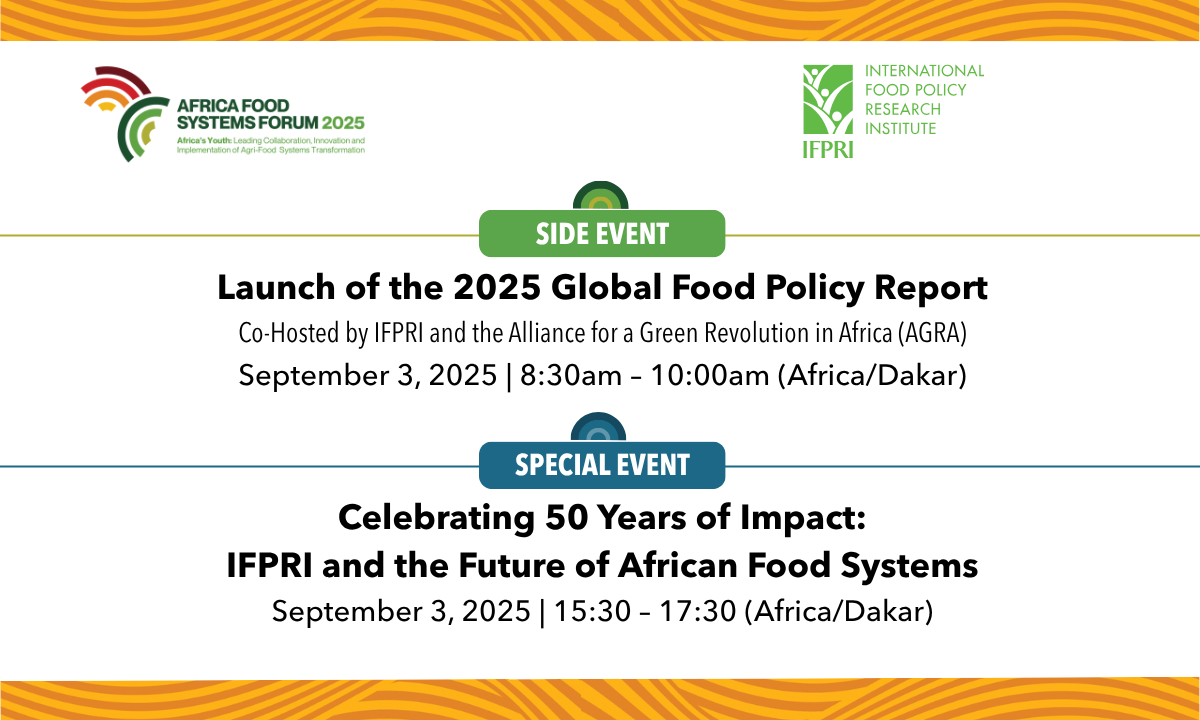
Africa Food Systems Forum 2025 Summit
The Africa Food Systems Forum will host its annual summit in Dakar, Senegal, from August 31 to September 5, 2025. Africa’s Food Systems Forum, formerly AGRF, is the world’s premier forum for African agriculture and food systems, bringing together stakeholders to take practical actions and share lessons that will move African food systems forward. Africa…
Press Releases and Media Mentions
-
IFPRI and ICAR Convene South Asia Dialogue on Food Policy to Spotlight Priorities for Resilient, Healthy, and Inclusive Food Systems
The dialogue brought together senior policymakers, researchers, and development partners to reflect on how South Asia can secure resilient, inclusive, and sustainable food systems amid mounting pressures of climate change,…
-
Food policy: Lessons and priorities for a changing world (VoxDevTalks)
Johan Swinnen and Purnima Menon were interviewed for this new episode of the VoxDevTalks podcast, where they discuss IFPRI’s landmark 2025 Global Food Policy Report, which reviews 50 years of…
-
The 2025 Global Report on Food Crises sounds the alarm (MSN South Africa)
MSN South Africa cited research from IFPRI’s 2025 Global Food Policy Report: Food Policy: Lessons and Priorities for a Changing World in this article on the 2025 Global Report on…
Blogs
-
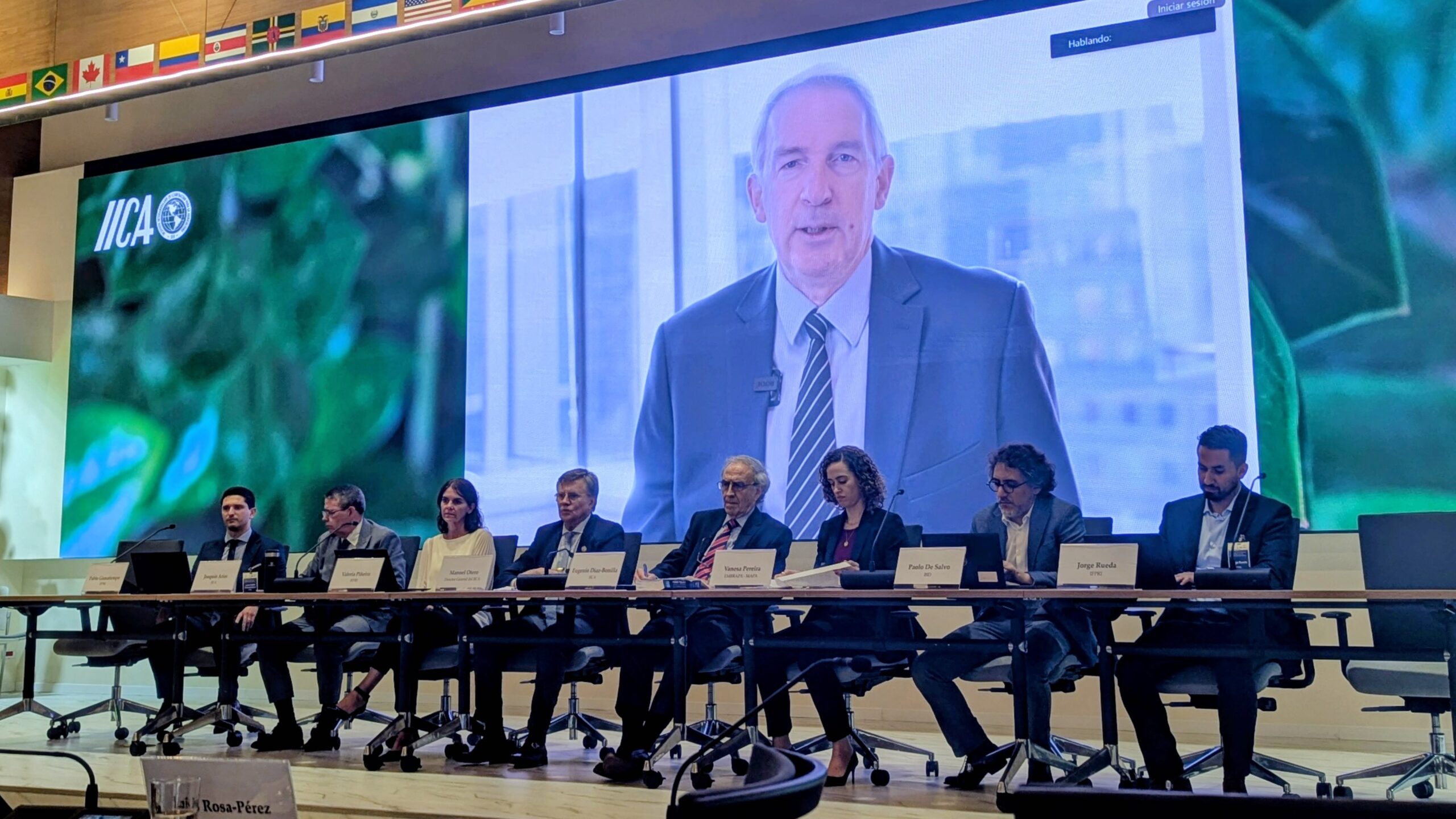
Celebrating 50 years of IFPRI: Transforming agrifood systems in Latin America and the Caribbean
Regional insights from the 2025 Global Food Policy Report.
-
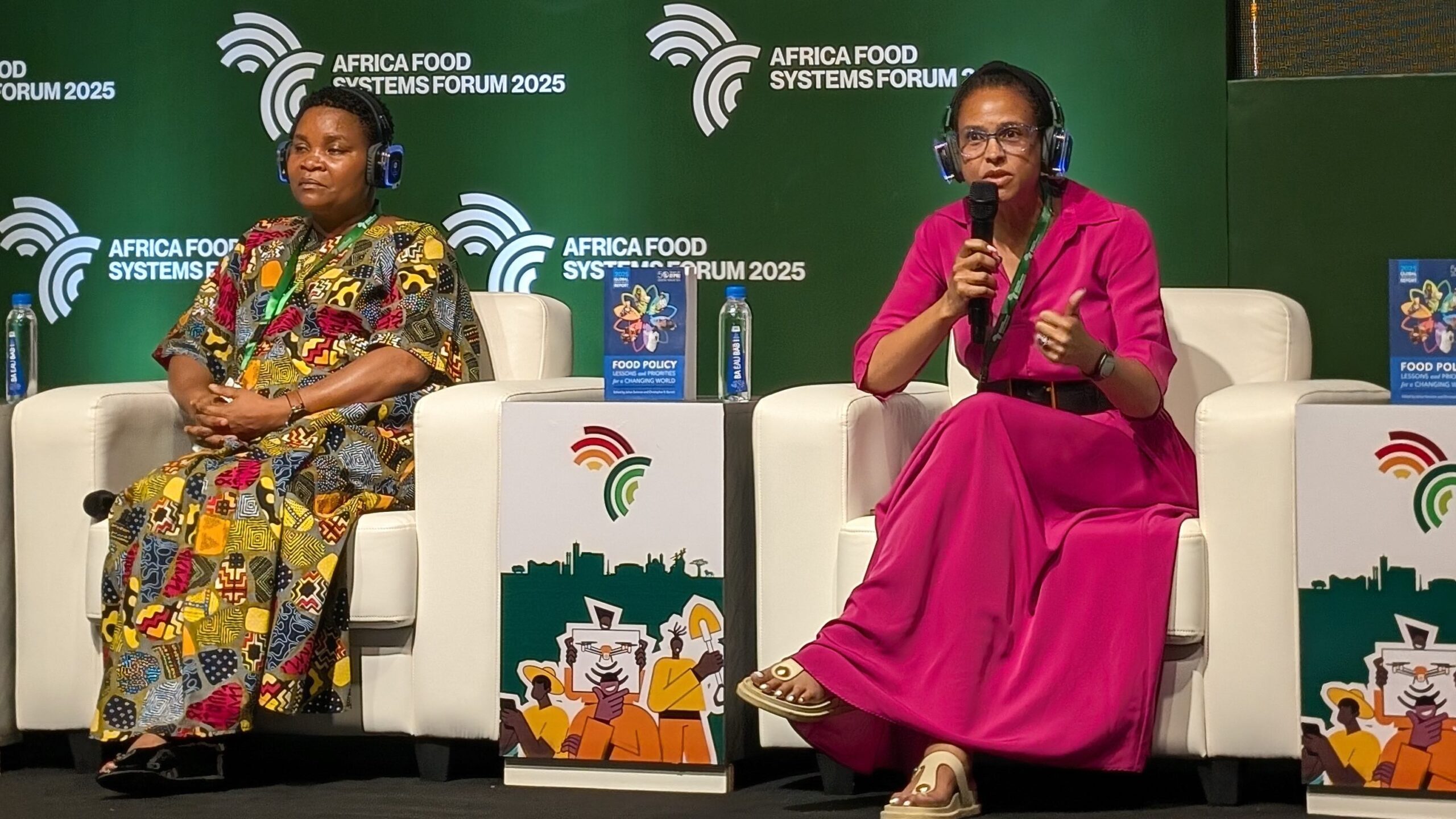
IFPRI 2025 Global Food Policy Report Africa launch: Charting a course for agrifood system transformation
Lessons from 50 years of IFPRI research.

Social Media Toolkit
Explore our 2025 Global Food Policy Report social media toolkit. This social media toolkit includes multiple options for messaging for various social media platforms, as well as social media images.
Hashtags: #GFPR2025 #IFPRI50
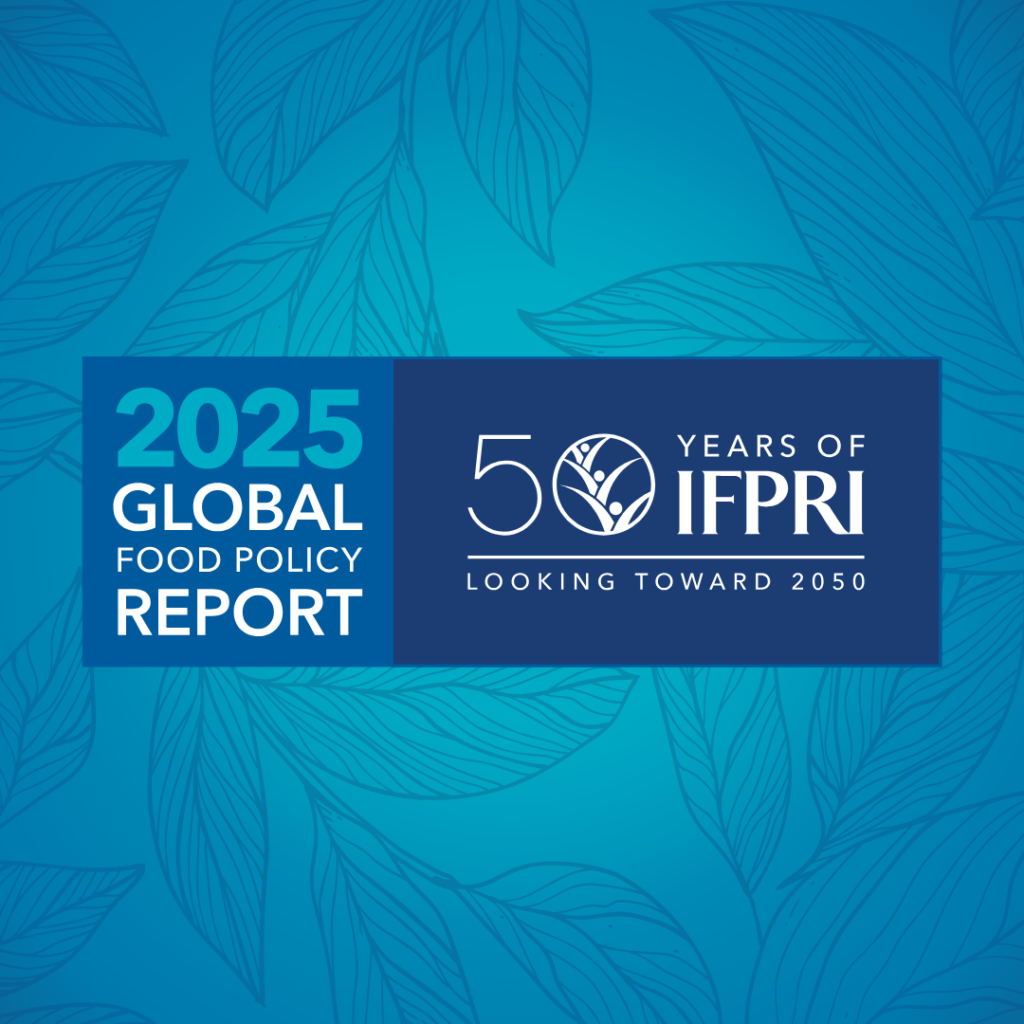
Past Reports
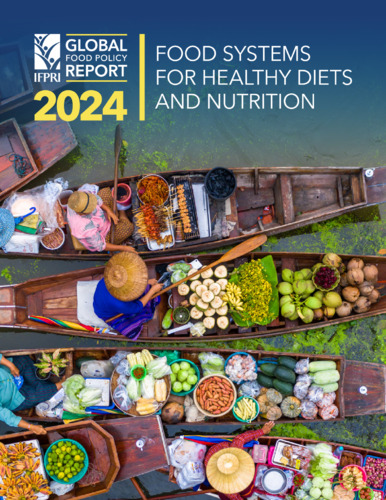
Book
Global food policy report 2024: Food systems for healthy diets and nutrition
2024International Food Policy Research Institute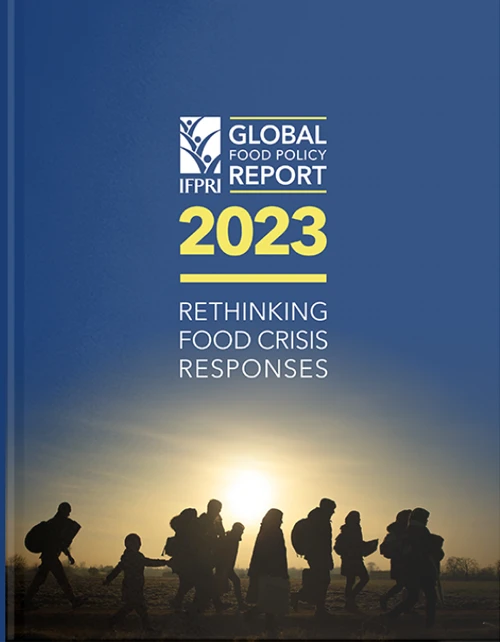
Book
Global food policy report 2023: Rethinking food crisis responses
2023International Food Policy Research Institute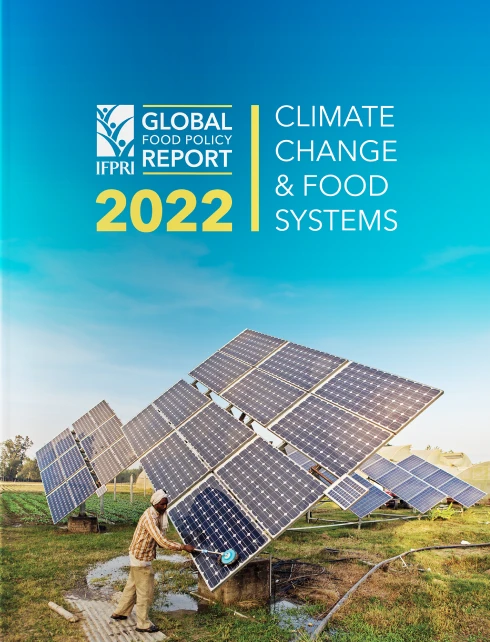
Book
2022 Global food policy report: Climate change and food systems
2022International Food Policy Research Institute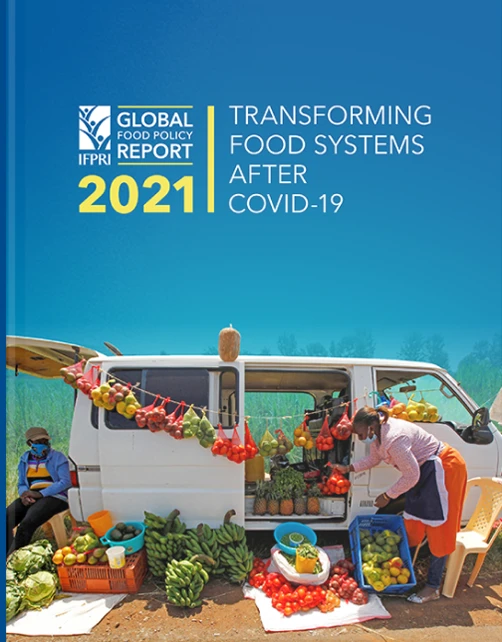
Book



